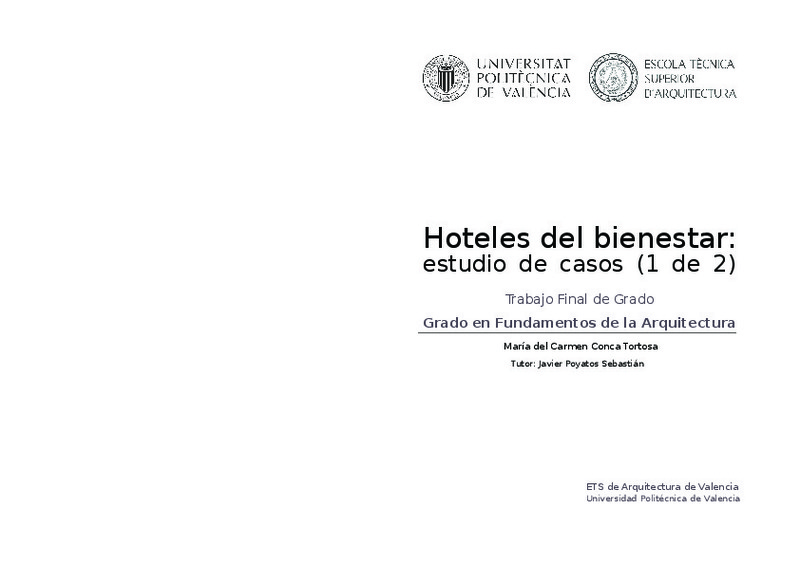JavaScript is disabled for your browser. Some features of this site may not work without it.
Buscar en RiuNet
Listar
Mi cuenta
Estadísticas
Ayuda RiuNet
Admin. UPV
Hoteles de bienestar: estudio de casos (1 de 2)
Mostrar el registro sencillo del ítem
Ficheros en el ítem
| dc.contributor.advisor | Poyatos Sebastian, Javier
|
es_ES |
| dc.contributor.author | Conca Tortosa, María del Carmen
|
es_ES |
| dc.date.accessioned | 2018-01-19T17:27:23Z | |
| dc.date.available | 2018-01-19T17:27:23Z | |
| dc.date.created | 2016-11-15 | |
| dc.date.issued | 2018-01-19 | es_ES |
| dc.identifier.uri | http://hdl.handle.net/10251/95312 | |
| dc.description.abstract | [ES] "Hoteles del bienestar: estudio de casos (1 de 2 )" constituye un proyecto teórico-práctico que investiga el bienestar ambiental a través de la arquitectura de hoteles contemporánea, tomando como base la experiencia humana desde el punto de vista de la fenomenología del habitar. En la fase hermenéutica se desarrolla un método de análisis fenomenológico de carácter empírico basado en los niveles del habitar (corpóreo-sensoriales y anímicos) junto a sus sinergias, entendidos como los componentes esenciales que, al relacionar al habitante con el ambiente, integran la experiencia del habitar. Posteriormente se aplica el método de análisis cualitativo desarrollado a tres casos modélicos de estudio dentro del continente europeo, escogidos tanto por su calidad arquitectónica y constatada satisfacción de los usuarios como por su alto grado de bienestar ambiental. | es_ES |
| dc.description.abstract | [EN] "Wellness Hotels: case studies (1 out of 2 )" is a theoretical and practical project that investigates the environmental well-being through the contemporary architecture of hotels, based on the human experience from the point of view of the phenomenology of dwelling. The hermeneutics phase developes an empirical and phenomenological method of analysis based on the levels of dwelling (sensory and mood) alongside their synergies; as they are understood as essential components that integrate the experience of dwelling by relating the inhabitant with the architectural environment. Afterwards, the qualitative analysis method developed is subsequently applied on three exemplary case studies within the European continent, chosen both for its architectural quality and proven user satisfaction, as well as its high degree of environmental well-being. | es_ES |
| dc.format.extent | 69 | es_ES |
| dc.language | Español | es_ES |
| dc.publisher | Universitat Politècnica de València | es_ES |
| dc.rights | Reserva de todos los derechos | es_ES |
| dc.subject | Architecture | es_ES |
| dc.subject | Hotels | es_ES |
| dc.subject | Well-being | es_ES |
| dc.subject | Dwelling | es_ES |
| dc.subject | Environment | es_ES |
| dc.subject | Phenomenology | es_ES |
| dc.subject | Arquitectura | es_ES |
| dc.subject | Hoteles | es_ES |
| dc.subject | Bienestar | es_ES |
| dc.subject | Modos de habitar | es_ES |
| dc.subject | Confort ambiental | es_ES |
| dc.subject | Fenomenología | es_ES |
| dc.subject.classification | COMPOSICION ARQUITECTONICA | es_ES |
| dc.subject.other | Grado en Fundamentos de la Arquitectura-Grau en Fonaments de l'Arquitectura | es_ES |
| dc.title | Hoteles de bienestar: estudio de casos (1 de 2) | es_ES |
| dc.type | Proyecto/Trabajo fin de carrera/grado | es_ES |
| dc.rights.accessRights | Abierto | es_ES |
| dc.description.bibliographicCitation | Conca Tortosa, MDC. (2016). Hoteles de bienestar: estudio de casos (1 de 2). http://hdl.handle.net/10251/95312 | es_ES |
| dc.description.accrualMethod | TFGM | es_ES |
| dc.relation.pasarela | TFGM\21580 | es_ES |
Este ítem aparece en la(s) siguiente(s) colección(ones)
-
ETSA - Trabajos académicos [4687]
Escuela Técnica Superior de Arquitectura






